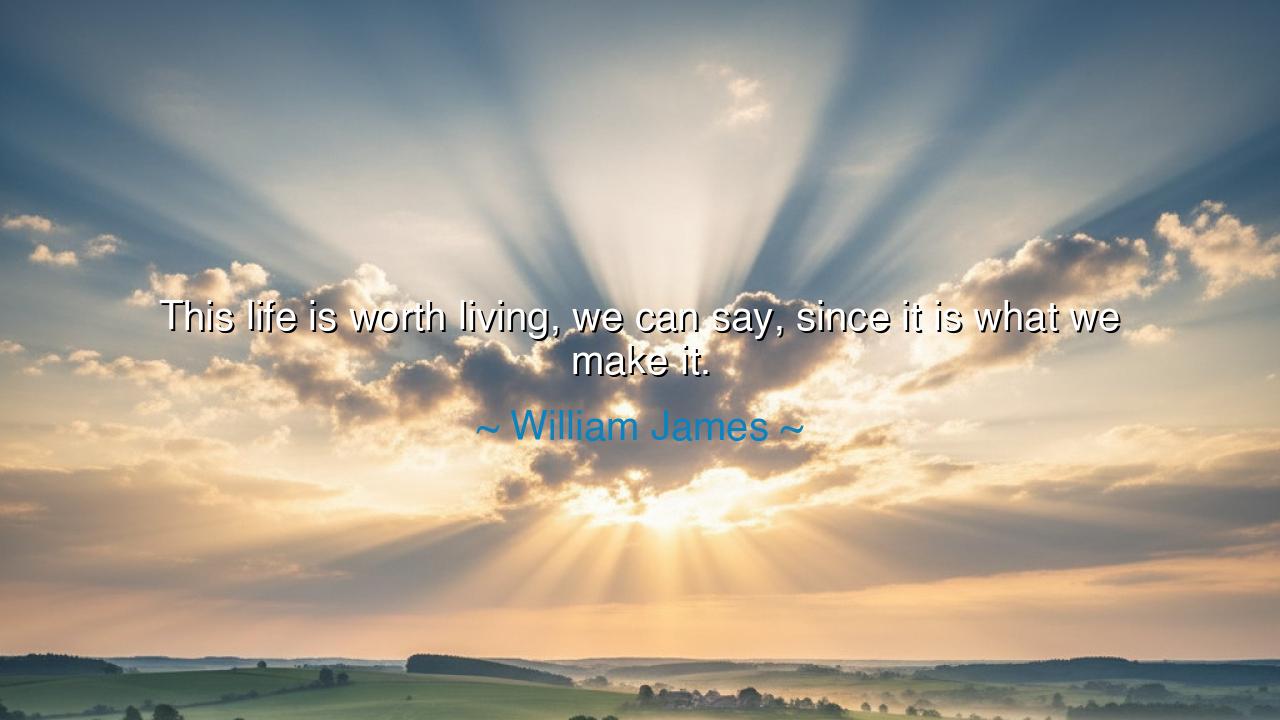
This life is worth living, we can say, since it is what we make






In the luminous clarity of his mind, William James, the father of modern psychology, once declared: “This life is worth living, we can say, since it is what we make it.” These words, born not from naïve optimism but from deep reflection on the human spirit, remind us that life’s worth is not bestowed — it is created. It is not the external world that determines our joy, but the inner attitude with which we shape our days. In this simple yet profound statement, James captures the essence of freedom — that we are not prisoners of circumstance, but sculptors of meaning, artists of our own existence.
To say that life “is what we make it” is to awaken to the truth that the universe does not hand us happiness fully formed. It gives us the clay of experience, and it is we who must mold it with our thoughts, our choices, and our courage. Many wander through their days lamenting fate, but the wise see that fate is but the stage — character writes the play. Whether one’s days are bathed in light or shadow depends less on the events that unfold and more on the spirit that meets them. Thus, James’s words are a call to inner strength, a reminder that even amid chaos and sorrow, we can carve beauty from our pain and meaning from our struggle.
Consider the life of Helen Keller, born into silence and darkness. Reason would say her life was unlivable, that her fate was sealed in tragedy. But through the guidance of her teacher Anne Sullivan, and her own indomitable will, Helen awakened to the world — to language, to thought, to purpose. She could not hear music or see the dawn, yet she declared life rich beyond measure. Her story stands as a living testament to James’s teaching: that life becomes worthy not by what it gives us, but by what we give to it.
William James himself wrestled with despair and doubt. He was not a man speaking from an ivory tower of comfort, but from the battlefield of the soul. He knew the paralysis of indecision, the haunting question of whether life held meaning at all. It was through his philosophy of pragmatism — the belief that truth and value are found in what works, what uplifts, what transforms — that he found his way out of darkness. In saying “life is worth living,” James does not deny suffering; he transcends it. He tells us that meaning is not discovered like treasure, but forged like iron — in the fire of our daily actions and the choices we make in the face of uncertainty.
The ancients understood this wisdom too. The Stoics taught that while we cannot command the winds, we can adjust our sails. Marcus Aurelius, emperor and philosopher, faced war, loss, and betrayal, yet wrote in his meditations: “The universe is change; our life is what our thoughts make it.” The echo of James’s insight resounds here — across centuries, across philosophies — that the power to make life worthy lies within. The gods do not promise ease, but they grant the strength of will, the capacity to turn suffering into wisdom and failure into growth.
And so, what then is the lesson for us, the wanderers of the modern world, so often restless and uncertain? It is this: do not wait for life to reveal its worth — reveal it yourself. If the days seem dull, paint them with purpose. If the road is hard, let each step be an act of defiance against despair. If joy feels distant, create it in small acts of kindness and gratitude. Life is neither gift nor punishment; it is raw material. The question is not, “Is life worth living?” but “Will I make it so?”
Therefore, my children, rise each day with the resolve of the artisan and the faith of the dreamer. Work upon your life as the sculptor upon marble — patiently, passionately, with reverence for the shape yet unseen. Remember, meaning is not found — it is made. And in making meaning, you make life itself beautiful.
For when the years have passed and your days draw to a close, may you look upon the path you have walked and say, as William James did, not with pride but with peace: “This life was worth living — because I made it so.”






AAdministratorAdministrator
Welcome, honored guests. Please leave a comment, we will respond soon